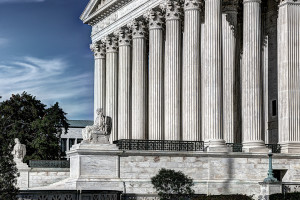Securities Act of 1933: In Omnicare v. Laborers Dist. Council

In Omnicare v. Laborers Dist. Council, 135 S. Ct. 1318 (2015), the U.S. Supreme Court interpreted section 11 of the Securities Act of 1933, which addresses the liability for statements of opinion that had divided the Federal Courts of appeal.
Prior to issuing securities, the Securities Act of 1933 requires companies to file a registration statement containing specified information about the issuing company and the securities offered. To promote disclosure and prevent investment fraud, Section 11 of the Securities Act imposes liability if the registration statement either “contain[s] an untrue statement of a material fact” or “omit[s] to state a material fact . . . necessary to make the statements therein not misleading.”
Omnicare filed a registration statement in connection with a public offering of common stock that included contained two statements expressing the company’s opinion that it was in compliance with federal and state laws. After the federal government prosecuted Omnicare for allegedly receiving kickbacks from pharmaceutical manufacturers, several pension funds that purchased Omnicare stock sued the company under Section 11. The funds claimed that Omnicare’s legal-compliance statements constituted “untrue statement[s] of . . . material fact” and that Omnicare “omitted to state [material] facts necessary” to make those statements not misleading.
The District Court dismissed the suit, finding that the funds failed to allege that Omnicare’s officers knew they were violating the law. The Sixth Circuit reversed. While the appeals court acknowledged that the statements at issue expressed opinions, it held that no showing of subjective disbelief was required. Rather, the funds’ allegations that Omnicare’s legal-compliance opinions were objectively false were sufficient to support their claim.
The Court’s Decision
The U.S. Supreme Court disagreed. It held that a statement of opinion, even if shown to be objectively false, cannot constitute an “untrue statement of fact” under Section 11. In reaching the opposite conclusion, the Court held that the Sixth Circuit “wrongly conflates facts and opinions.” As Justice Elena Kagan wrote on behalf of the unanimous Court, “a statement of fact expresses certainty about a thing, whereas a statement of opinion conveys only an uncertain view as to that thing.”
In reaching its decision, the Supreme Court analyzed Section 11’s two clauses independently. With regard to statements of opinion, the Court clarified that a statement of opinion does not constitute an “untrue statement of . . . fact” simply because the stated opinion ultimately proves incorrect. Rather, the Court held that “a statement of opinion thus qualifies as an ‘untrue statement of . . . fact’ if that fact is untrue—i.e., if the opinion expressed was not sincerely held.”
With regard to the omissions clause, the Court held that Section 11 liability may arise if a registration statement omits material facts about the issuer’s inquiry into, or knowledge concerning, a statement of opinion, and if those facts conflict with what a reasonable investor, reading the statement fairly and in context, would take from the statement.
“A reasonable investor may, depending on the circumstances, understand an opinion statement to convey facts about how the speaker has formed the opinion — or, otherwise put, about the speaker’s basis for holding that view,” Justice Kagan explained. “And if the real facts are otherwise, but not provided, the opinion statement will mislead its audience.”
Previous Articles
SCOTUS Wraps Up Oral Arguments for the Term
by DONALD SCARINCI on May 17, 2022
The U.S. Supreme Court has concluded its oral arguments for the October 2021 Term. The justices hea...
SCOTUS Rules Censure of Elected Board Member Didn’t Violate First Amendment
by DONALD SCARINCI on May 10, 2022
In Houston Community College System v. Wilson, 595 U.S. ____ (2022), the U.S. Supreme Court held th...
Supreme Court Breach Is Not the First Involving Roe v. Wade
by DONALD SCARINCI on
The recent disclosure of Justice Samuel Alito’s decision purporting to overturn Roe v. Wade is ar...
The Amendments
-
Amendment1
- Establishment ClauseFree Exercise Clause
- Freedom of Speech
- Freedoms of Press
- Freedom of Assembly, and Petitition
-
Amendment2
- The Right to Bear Arms
-
Amendment4
- Unreasonable Searches and Seizures
-
Amendment5
- Due Process
- Eminent Domain
- Rights of Criminal Defendants
Preamble to the Bill of Rights
Congress of the United States begun and held at the City of New-York, on Wednesday the fourth of March, one thousand seven hundred and eighty nine.
THE Conventions of a number of the States, having at the time of their adopting the Constitution, expressed a desire, in order to prevent misconstruction or abuse of its powers, that further declaratory and restrictive clauses should be added: And as extending the ground of public confidence in the Government, will best ensure the beneficent ends of its institution.




